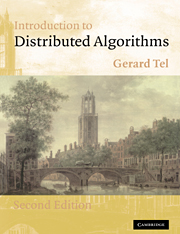Book contents
- Frontmatter
- Contents
- Preface
- 1 Introduction: Distributed Systems
- Part One Protocols
- Part Two Fundamental Algorithms
- 6 Wave and Traversal Algorithms
- 7 Election Algorithms
- 8 Termination Detection
- 9 Anonymous Networks
- 10 Snapshots
- 11 Sense of Direction and Orientation
- 12 Synchrony in Networks
- Part Three Fault Tolerance
- Part Four Appendices
- References
- Index
7 - Election Algorithms
Published online by Cambridge University Press: 05 June 2012
- Frontmatter
- Contents
- Preface
- 1 Introduction: Distributed Systems
- Part One Protocols
- Part Two Fundamental Algorithms
- 6 Wave and Traversal Algorithms
- 7 Election Algorithms
- 8 Termination Detection
- 9 Anonymous Networks
- 10 Snapshots
- 11 Sense of Direction and Orientation
- 12 Synchrony in Networks
- Part Three Fault Tolerance
- Part Four Appendices
- References
- Index
Summary
In this chapter the problem of election, also called leader finding, will be discussed. The election problem was first posed by LeLann [LeL77], who also proposed the first solution; see Subsection 7.2.1. The problem is to start from a configuration where all processes are in the same state, and arrive at a configuration where exactly one process is in state leader and all other processes are in the state lost.
An election under the processes must be held if a centralized algorithm is to be executed and there is no a priori candidate to serve as the initiator of this algorithm. For example, this could be the case for an initialization procedure that must be executed initially or after a crash of the system. Because the set of active processes may not be known in advance it is not possible to assign one process once and for all to the role of leader.
A large number of results about the election problem (algorithms as well as more general theorems) exist. The results in this chapter were selected for inclusion with the following criteria in mind.
Synchronous systems, anonymous processes, and fault tolerant algorithms are discussed in other chapters. In this chapter it is always assumed that processes and channels are reliable, the system is fully asynchronous, and the processes are distinguished by unique identities.
The election problem has taken the role of a “benchmarking problem” to compare the efficiency of different computation models.
- Type
- Chapter
- Information
- Introduction to Distributed Algorithms , pp. 227 - 267Publisher: Cambridge University PressPrint publication year: 2000
- 1
- Cited by



